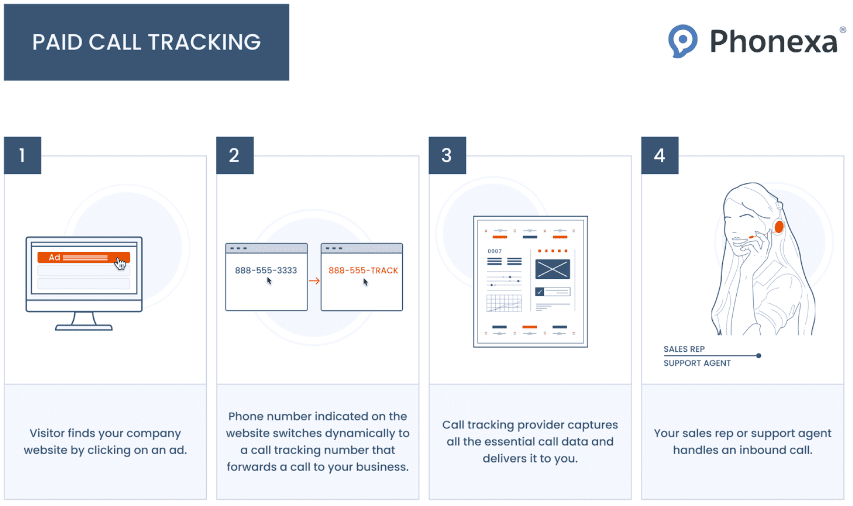Capitalizing on customer interactions across diverse touchpoints is crucial as businesses venture deeper into the digital epoch. Among many tools to facilitate this, one often overlooked is call tracking. In its essence, call tracking involves logging and interpreting phone call data — a critical process that can revolutionize lead generation and conversion rates.

Source: ZipDo
A Detailed Exploration of Call Tracking in Today’s B2B Landscape
Call tracking applications remain important yet often overlooked tools in the wide expanse of successful lead generation strategies. These applications dive deep into the data associated with phone calls, mining valuable insights that propel data-driven decision-making.
Call tracking applications excel at logging and analyzing a wide spectrum of data from your phone calls. This spectrum includes information such as the geographical location of the callers, the marketing campaigns prompting the calls, and other specific attributes. This treasure trove of data provides businesses with granular insights into their prospective customers’ behavior, preferences, and engagement patterns.
Beyond providing a deep understanding of your phone calls’ origins, call tracking tools also serve as a conduit to actionable intelligence. They identify high-performing marketing channels, effectively guiding businesses in their resource allocation. This targeted approach toward investing time and capital ensures maximum productivity and returns from the selected channels.
Furthermore, call tracking systems offer businesses a lens into the customer journey. These systems illuminate the customer experience while tracing the customer’s path from the initial marketing touchpoint to the resulting phone call. This intimate understanding of customer interactions empowers businesses to refine their strategies and engagement models, leading to smoother customer journeys and improved conversion rates.
Having established the undeniable significance of call tracking applications in the B2B landscape, let’s delve deeper into how leveraging call tracking can supercharge your B2B conversions.
Also, to learn more about how call tracking can enhance your business, you can watch this educational video:
Call Tracking: A Potent Asset in B2B Marketing
In today’s hyper-competitive business landscape, deriving meaningful insights from customer interactions is key to driving successful marketing strategies. Call tracking is a potent tool that has been making waves in the B2B arena. Call tracking, known for its effectiveness in illuminating the black box of customer interaction data, is rapidly becoming a game-changer for businesses worldwide, and here’s why:
- Empowering data-driven decisions: Call tracking arms businesses with invaluable data-driven insights, revealing the most potent marketing channels. This knowledge enables companies to distribute their resources strategically and efficiently.
- Optimizing ROI: By pinpointing the sources of high-quality leads, call tracking ensures targeted marketing expenditures, resulting in a substantial uplift in the ROI of marketing initiatives.
- Elevating customer experience: Businesses can better understand customer journeys using a call tracking matrix. This insight allows them to create personalized experiences that boost customer satisfaction and conversion rates.
To fully comprehend the impact of call tracking, let’s delve deeper into how it influences lead generation.
Diving Deeper: Call Tracking and Lead Generation
The foundation of any B2B conversion strategy is a robust and effective lead generation process. Here’s an in-depth look at how call tracking can bolster your lead generation efforts:
| Key Benefits | Description |
| 1. Differentiating High-Quality Leads | Call tracking is pivotal in distinguishing between various lead sources. It sheds light on which sources generate high-quality leads, paving the way for precise refinement of marketing campaigns for improved outcomes. |
| 2. Enhancing Outbound Lead Generation | Call tracking’s unique ability to monitor sales calls provides a clearer understanding of outbound lead generation campaigns’ effectiveness. As the dynamics between inbound and outbound marketing continue to evolve in the B2B landscape, real-time insights become even more vital in enabling necessary adjustments and promoting campaign optimization. |
| 3. Empowering SaaS Lead Generation | Especially pertinent in the SaaS business realm, where sales cycles can be complex and lengthy, call tracking provides critical granular data. This data is instrumental in fine-tuning lead generation strategies and improving conversion rates. |
| 4. Improving Marketing ROI | Call tracking can reveal the most effective marketing channels and campaigns by tracking the source of calls. Businesses can optimize their marketing ROI by focusing resources on these high-performing areas. |
| 5. Enhancing Customer Experience | Call tracking also allows for a deep understanding of the customer journey. It helps businesses personalize customer interactions, improve customer satisfaction and retention, and boost conversion rates. |
With the stage set, let’s explore the profound impact of call tracking on B2B conversion rates.
Call Tracking: Unlocking the Potential of B2B Conversion Rate Optimization
When it comes to B2B conversion rate optimization, call tracking solutions such as call tracker are indispensable. A comprehensive overview of customer interactions empowers businesses to make data-driven decisions that significantly enhance their B2B conversion rates.
Integrating top-tier call tracking solutions into your B2B strategy can considerably boost your average B2B lead conversion rate, driving improved results across the gamut of your marketing campaigns.
How Call Tracking Influences B2B Lead Generation Tactics
Call tracking applications wield significant influence in shaping B2B lead generation tactics. By providing businesses with a wealth of valuable data, these applications are instrumental in formulating bespoke marketing strategies. The aim of these strategies is not only to attract but also to generate high-quality, sales-ready leads.
Call tracking reports encompass an impressive range of information, from call duration and caller location to the day and time of the call and even the sentiment expressed during the conversation. When analyzed correctly, this data provides businesses with a deep understanding of customer behavior patterns.
Brands equipped with this knowledge can design and execute lead generation strategies that resonate with their target audience, promoting meaningful engagement and bolstering conversions.

The advantages of call tracking do not end with the crafting of strategies. The insights derived from call tracking reports empower businesses to monitor their lead generation campaigns’ performance over time. These reports provide an in-depth look into the success or shortcomings of various marketing efforts. They enable businesses to identify which campaigns are driving phone calls and, more importantly, which are driving conversions.
The real-time aspect of call tracking offers businesses a dynamic view of their marketing landscape. It allows for immediate adjustments based on the ongoing performance of campaigns, giving brands the agility to react swiftly to shifts in customer behavior or market conditions. This ability to make real-time, data-driven adjustments is critical for maintaining campaign effectiveness, maximizing marketing ROI, and ensuring a steady influx of high-quality leads.
With this knowledge, businesses can design and execute lead generation strategies, like crafting persuasive email marketing campaigns that resonate with their target audience, promoting meaningful engagement, and boosting conversions.
The Future of Call Tracking: Embracing a Data-Driven Era
The future of call tracking holds promise, with advancements like international call tracking and call tracking APIs on the horizon. These technologies enable businesses to track and analyze calls globally, paving the path for growth and scalability.
Emerging technologies in call tracking are further bolstering its capabilities. For instance, AI-powered call tracking applications can analyze call recordings to extract invaluable insights about customer preferences and behaviors, significantly augmenting lead generation efforts by enabling businesses to personalize their marketing and sales strategies.
Furthermore, with the advent of call tracking APIs, businesses can integrate call tracking data with other business tools, such as CRM systems and marketing automation platforms. This integration offers a holistic view of the customer journey, enabling more informed business decisions and bolstering marketing effectiveness.
In conclusion, call tracking is a transformative tool that maximizes B2B conversions by enhancing lead generation. Its ability to deliver insightful, data-driven information renders it an invaluable asset to your marketing arsenal. Implementing call tracking into your strategy ensures no lead is overlooked, ultimately guiding your business toward unprecedented success.


































